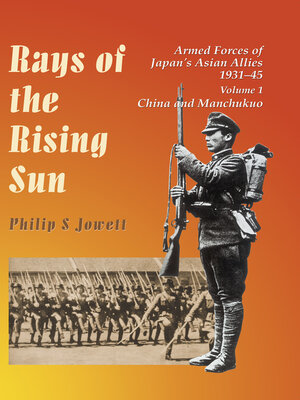Rays of the Rising Sun
ebook ∣ Armed Forces of Japan's Asian Allies 1931-45: China and Manchukuo
By John Berger

Sign up to save your library
With an OverDrive account, you can save your favorite libraries for at-a-glance information about availability. Find out more about OverDrive accounts.
Find this title in Libby, the library reading app by OverDrive.



Search for a digital library with this title
Title found at these libraries:
| Library Name | Distance |
|---|---|
| Loading... |
The first of a three-volume series examining the history of Chinese "puppet" soldiers fighting for the Japanese before and during World War II.
When the Japanese Empire went to war with the Allies in December 1941. it had already been fighting in China for 10 years. During that time, it had conquered huge areas of China, and subjugated millions of people. The Japanese needed to control the Chinese population in these occupied territories, and for this reason they set up governments from amongst the leaders of the Chinese who were willing to co-operate with them. These so-called "puppet" governments were designed to rule on behalf of the Japanese while firmly under their control. In turn, the "puppet" governments needed their own armed forces to help them maintain control over the populace and so they raised their own 'independent' armed forces. These "puppet" armies were in large number, reaching a total of well over 1 million before 1945. Although poorly armed and equipped, these forces had an influence on the Japanese war effort through sheer numbers.
The Chinese "puppet" soldiers ranged from the well-drilled and trained regular Army of the Last Emperor of China, Pu Yi, who ruled the newly formed state of Manchukuo, 1932–45, to the irregular Mongol cavalry who served alongside Japanese troops in the "secret war" waged in the Mongolian hinterlands.
The troops were dismissed as traitors by the Chinese fighting the Japanese, and they were equally despised by the Japanese themselves. The troops were motivated by a range of reasons, from simple survival to a loyalty to their commander. The fact that so many Chinese were willing to fight for the Japanese was embarrassing to all sides, and for this reason has been largely ignored in previous histories of the war in the East. In the first of a three-volume series, Philip Jowett tells the story of the Chinese who fought for the Japanese over a fourteen-year period.
When the Japanese Empire went to war with the Allies in December 1941. it had already been fighting in China for 10 years. During that time, it had conquered huge areas of China, and subjugated millions of people. The Japanese needed to control the Chinese population in these occupied territories, and for this reason they set up governments from amongst the leaders of the Chinese who were willing to co-operate with them. These so-called "puppet" governments were designed to rule on behalf of the Japanese while firmly under their control. In turn, the "puppet" governments needed their own armed forces to help them maintain control over the populace and so they raised their own 'independent' armed forces. These "puppet" armies were in large number, reaching a total of well over 1 million before 1945. Although poorly armed and equipped, these forces had an influence on the Japanese war effort through sheer numbers.
The Chinese "puppet" soldiers ranged from the well-drilled and trained regular Army of the Last Emperor of China, Pu Yi, who ruled the newly formed state of Manchukuo, 1932–45, to the irregular Mongol cavalry who served alongside Japanese troops in the "secret war" waged in the Mongolian hinterlands.
The troops were dismissed as traitors by the Chinese fighting the Japanese, and they were equally despised by the Japanese themselves. The troops were motivated by a range of reasons, from simple survival to a loyalty to their commander. The fact that so many Chinese were willing to fight for the Japanese was embarrassing to all sides, and for this reason has been largely ignored in previous histories of the war in the East. In the first of a three-volume series, Philip Jowett tells the story of the Chinese who fought for the Japanese over a fourteen-year period.







